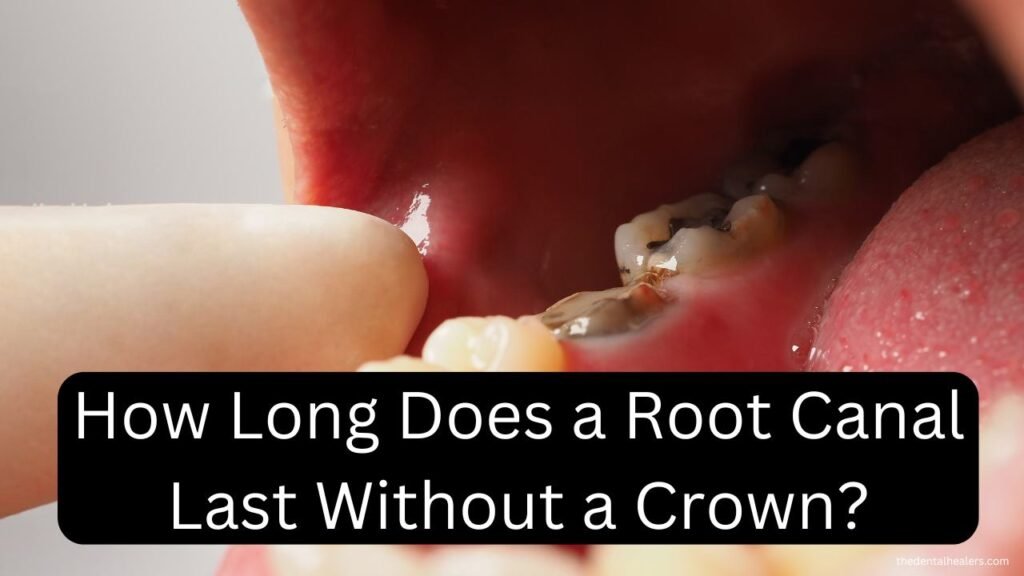How Long Does a Root Canal Last Without a Crown?
Wondering how long a root canal lasts without a crown? You’re not alone. Many people face this dilemma after undergoing a root canal treatment. The root canal procedure saves your tooth from severe decay or infection by removing the damaged pulp and sealing the tooth.
However, the real question is, can this tooth survive without a crown?
In this article, we’ll dive into the lifespan of a root canal-treated tooth without a crown, factors affecting its longevity, and the importance of crowns in protecting your dental health.
Understanding the Root Canal Procedure
A root canal is an essential dental treatment that involves several detailed steps:
- Diagnosis: The dentist examines the tooth and takes X-rays to determine the extent of the infection.
- Anesthesia: Local anesthesia is administered to numb the area around the affected tooth.
- Access: A small hole is drilled into the tooth to access the infected pulp.
- Cleaning and Shaping: The dentist removes the infected pulp, cleans, and shapes the inside of the root canal using specialized tools.
- Sealing: The cleaned canals are filled with a biocompatible material, usually gutta-percha, and sealed to prevent reinfection.
This procedure eliminates pain and infection, preserving the tooth’s structure and function. But post-treatment care is crucial to ensure the tooth’s longevity.

Lifespan of a Root Canal-Treated Tooth Without a Crown
A root canal-treated tooth without a crown can last between 5 to 15 years. Several factors influence this duration:
- Tooth’s Structural Integrity: Teeth without crowns are three to six times more likely to fracture due to their brittle nature.
- Oral Hygiene Practices: Excellent oral hygiene significantly extends the lifespan of a root canal-treated tooth. Regular brushing, flossing, and dental check-ups help prevent decay and infection.
- Bite Forces: Molars, subjected to high bite forces, are at greater risk of breaking without a crown. Approximately 50% of root canal-treated molars without crowns fracture within five years.
- Location of the Tooth: Front teeth, which experience less pressure, may last longer without a crown but are still vulnerable to wear and tear.
Without a crown, root canal-treated teeth face increased risks of fracture and reinfection due to structural compromise and daily wear.
Why a Crown Is Crucial After a Root Canal
Crowns offer significant benefits for root canal-treated teeth:
- Prevents Tooth Fracture: Crowns provide a protective barrier that helps prevent fractures and cracks, especially for molars.
- Restores Tooth’s Shape and Function: Crowns restore the tooth’s shape, strength, and functionality, allowing it to withstand daily use effectively.
- Improves Aesthetics: Crowns match the color and appearance of natural teeth, enhancing overall aesthetics.
Long-term Cost Analysis: Investing in a crown can save money by preventing future dental issues. Potential fractures, infections, and subsequent treatments can far exceed the initial cost of a crown.
Comparing Crown Materials
Crowns can be made from various materials, each with its pros and cons:
Choosing the right crown material depends on the tooth’s location, the patient’s budget, and aesthetic preferences.
Alternatives to a Crown
While crowns are the most common recommendation after a root canal, alternatives exist, though they come with limitations:
- Dental Bonding: Suitable for minor repairs but not as durable as a crown.
- Inlay/Onlay: More durable than bonding but do not offer full coverage and protection.
- Dental Implants: An option for teeth that cannot be saved with a root canal or crown. Implants are long-lasting but can be more expensive and require surgery.
Comparison Table:
| Option | Durability | Aesthetics | Cost |
|---|---|---|---|
| Crowns | High | Excellent | High |
| Dental Bonding | Low to Medium | Good | Low to Medium |
| Inlay/Onlay | Medium to High | Very Good | Medium |
| Implants | Very High | Excellent | Very High |
Consultation Emphasis: It’s crucial to consult with a dentist to determine the best option for your specific situation.
Recognizing Signs of Trouble
Recognizing potential issues with a root canal-treated tooth without a crown is essential:
- Pain: Persistent or severe pain may indicate a problem, such as a crack or reinfection.
- Sensitivity: Increased sensitivity to hot or cold temperatures can signal exposure of the inner layers.
- Swelling: Swelling around the tooth or gums can indicate infection or other complications.
Early Detection Importance: Early detection of issues can prevent severe problems and extend the tooth’s lifespan. Regular dental check-ups are vital.
Preventive Measures: Maintaining good oral hygiene, avoiding hard foods, and wearing a mouthguard during sports can help prevent issues in root canal-treated teeth without crowns.
Emergency Care: In case of dental emergencies, such as a fractured tooth or severe pain, contact your dentist immediately. Temporary measures, such as avoiding chewing on the affected side, can help manage the situation until you see your dentist.
Frequently Asked Questions (FAQs)
- Is a crown always necessary after a root canal?
- Not always, but it is highly recommended to protect the tooth from fractures and decay.
- What are the signs of a failed root canal?
- Symptoms include persistent pain, sensitivity, swelling, and signs of infection.
- Can a root canal-treated tooth last without a crown?
- Yes, but it is more prone to fractures and reinfection, generally lasting 5-15 years without a crown.
Conclusion
A root canal-treated tooth without a crown generally lasts 5 to 15 years, depending on factors like structural integrity, oral hygiene, bite forces, and tooth location.
While crowns offer significant protective benefits, alternatives exist but come with limitations. Recognize signs of trouble early and maintain regular dental check-ups for optimal tooth health.